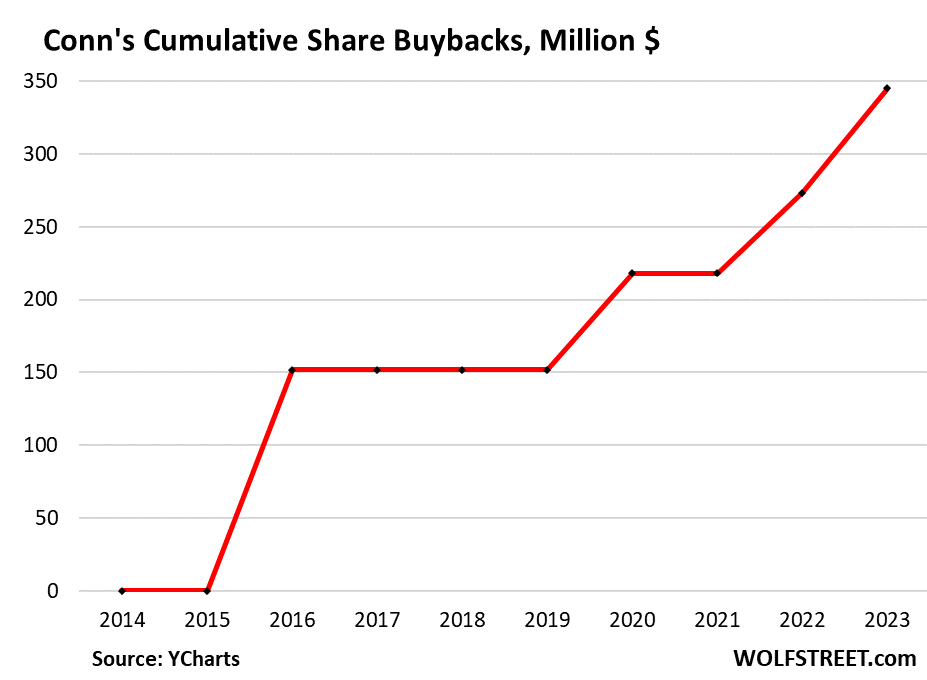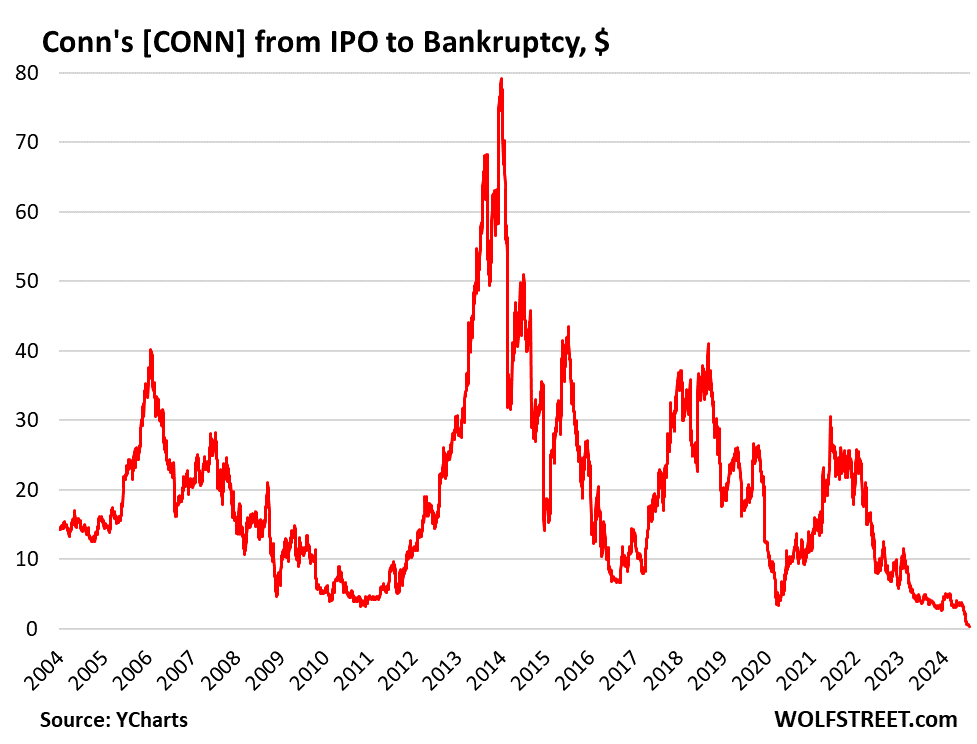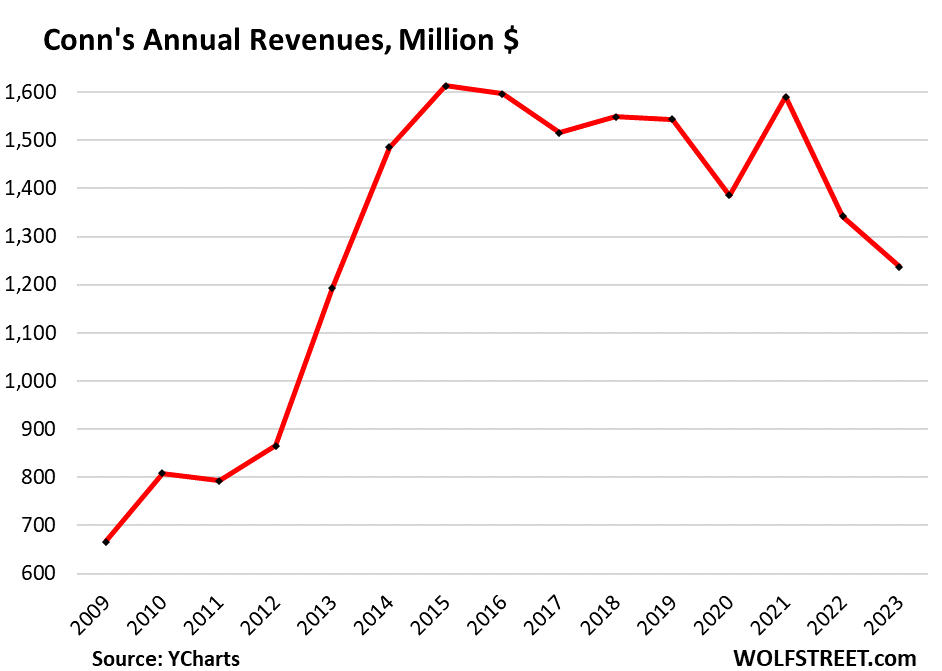A basket case for years. Acquiring W.S. Badcock was another great idea; 7 months later, both are bankrupt and liquidating.
By Wolf Richter for WOLF STREET.
Conn’s Inc., which has long been in trouble and finally filed for bankruptcy last week, and seems to be liquidating, according to the “going out of business sale” now posted on its website, is a 552-store retailer of furniture, appliances, electronics, and mattresses; and it is a lender, including for rent-to-own, to subprime customers who could not borrow elsewhere to fund their purchases at Conn’s. And those businesses – retail and high-risk credit – were one, with high-risk credit opening the door for more sales, despite Conn’s protestations to the contrary in its quarterly reports.
Let’s get this straight upfront: Conn’s wouldn’t have had to file for bankruptcy if it hadn’t kowtowed to Wall Street and incinerated $345 million in cash on share buybacks from 2016 through 2023, including $71 million in 2023 to unlock shareholder value or whatever, and prop up its collapsing shares, which expedited its fate.
Without those $345 million in share buybacks, it would have had enough cash and less debt to hang on for a while longer (data via YCharts):

The subprime-specialized retailer-lender then acquired with an all-share deal another troubled subprime-specialized retailer-lender, W.S. Badcock, in December 2023, with 376 stores. That addition to the 176 Conn’s stores brought the total store count to 552, according to its annual report for the fiscal year ended January 31, 2024.
The “Conn’s HomePlus” stores and “Badcock Home Furniture & more” stores are now engaged in an “everything must go” “Going Out Of Business Sale,” according to the landing pages of their respective websites. And “Conn’s no longer offers in-house credit,” it says, so bring your own damn money? The company appears to be liquidating.

Here are the credit-related subsidiaries involved in the bankruptcy:
- Conn Credit Corporation, Inc.
- CAI Credit Insurance Agency, Inc.
- CAI Holding LLC
- Conn Credit I, LP
- New RTO, LLC
- S. Badcock Credit I LLC
- S. Badcock Credit LLC
- S. Badcock LLC
- Conn Lending, LLC.
Periodically, Conn’s stock collapsed when it confessed to credit issues. These are two different businesses – retailing and high-risk lending to its own customers. As with the subprime-specialized auto dealers (some of which have imploded, Conn’s-like), those two businesses are fused into one, despite assurances of a Chinese wall between them.
But to prop up sales, bigger credit risks are taken, which initially looks good on the quarterly earnings reports because the revenues are visible, but not the potential losses on the credit when those customers cannot pay. And then periodically, there was some housecleaning and disclosure, and the stock collapsed.
Conn’s is the story of a subprime-specialized brick-and-mortar retailer amid what we’ve called since 2016 the Brick-and-Mortar Meltdown that has sent countless retail chains into bankruptcy and liquidation as Americans shifted their shopping to ecommerce. Conn’s made it into our Brick-and-Mortar Meltdown in December 2019, when its shares plunged 33% that day when it admitted to big issues in its credit portfolio, which suddenly re-caused the company to re-become “prudent” again and “tighten credit,” which then caused same-store sales to drop 8.5%.
And in 2014, there was another admission of subprime credit issues, which caused its shares to collapse by 60% in a week, and by 83% from their all-time high of $79.24 in December 2013.
So now, instead of another disclosure of credit issues and a cleanup that caused sales to plunge, the company admits it has run out of runway, and it’s over. Mopping up the mess is going to take place in bankruptcy court.
There was a meme-stock quality to these shares before the phrase had even been invented. They rocketed higher to a $2.8 billion valuation at the end of 2013, and then plunged, but kept bouncing back, but never to the prior highs, and the result was a 10-year-long jagged downtrend to bankruptcy that started in December 2013. Today, shares closed at $0.35 on their way to worthless (data via YCharts):

Buying troubled competitor W.S. Badcock in 2023 was another great idea that made a desperate situation even worse. The all-share acquisition closed in December 2023, seven months before the bankruptcy filing.
At the time, Conn’s press release was titled: “Conn’s, Inc. Announces Transformative Transaction with W.S. Badcock LLC.” Indeed, it was very “transformative,” resulting in bankruptcy and liquidation seven months later of both companies.
The acquisition was supposed to cover up the plunge in Conn’s own revenues. They’d peaked in 2015 at $1.61 billion. By its fiscal year ended January 31, 2024, they’d dropped 23% to $1.24 billion, despite rampant inflation in the prior years, and despite aggressive lending to their subprime customers so that they could buy this stuff, whose ultimate losses will now be sorted out under the supervision of a judge:

Enjoy reading WOLF STREET and want to support it? You can donate. I appreciate it immensely. Click on the mug to find out how:
![]()


Load up with debt, cash the bonus check, sell the stock – and watch the business implode. Sounds like what they learned in MBA class.
Exactly, the Capitalists at these businesses are running them perfectly.
Youre definitions are messed up. It’s not capitalism, it’s corruption.
Ah yes can’t let the proles figure out the real cause of their plight. It has to be obscured with terms like “corruption.” It’s important for Americans to be dumb and not realize the economic system they live under is oppressing them.
Weeb Richter,
Your proles will keep their plight because they are to lazy to check a definition of a simple concept.
The problem with you people is that someone convinced you that the system you have is capitalism, which is a lie.
Big corporation lobbying their way through government offcials to get ahead. Billionairs promoting politicians with huge amounts of money so that later said politicians will promote their interests. Paying bank customes with their own money when the bank fails. All of those is the opposite of capitalism, it’s corporate wellfare.
Quit embarasing yourself and pick up a f#$%@*g book.
Exactly. That and the required Ethics course.
I’ve always felt that being forced to take an ethics course breeds cynicism.
Except you forgot one step. “Get tax breaks from Trumps “Jobs” act and rather than reinvest (good ol trickle down theory), buy back shares to prop up share price.” That’s the step you forgot.
So many corporations did this. The Jobs Act created no real value in exchange for the massive amount it added to the deficit.
Ethics and Civics courses. For those who wish to not hurt others it breeds outrage, for those with no qualms about such things it signals opportunity.
This is the AI generated result for a search on stock buybacks:
“The Securities and Exchange Commission (SEC) legalized stock buybacks in 1982 with the introduction of Rule 10b-18, which allows a company’s board of directors to authorize the repurchase of a certain number of shares. Stock buybacks, also known as share repurchases, are a way for companies to return capital to shareholders by buying back their own shares from the marketplace. This reduces the number of outstanding shares, which increases the ownership stake of stakeholders. Companies may buy back shares for a variety of reasons, including to invest in themselves, improve financial ratios, or reduce dilution from employee stock option plans.”
This is why stock buybacks should have been kept illegal:
Investopedia
Stock buybacks can have tax advantages and can be more flexible than dividends, and companies have often returned more to shareholders through buybacks than dividends. However, some view buybacks as a bad practice. For example, buybacks can inflate a company’s share price and earnings per share, which can guide lucrative executive bonuses.
========================
In a lot of cases, executive management does stock buybacks to boost short-term stock prices and the executives cash out their options at the higher prices. In some extreme cases, this is done in spite of the companies not doing well – the executives cash out and just walk away from their mortally wounded companies. This is literal theft by executive management. So why did the SEC under Reagan make this practice legal?
To his credit, Biden has tried to make stock buybacks expensive by increasing the taxes on them four-fold. But our lawmakers have been bought and paid for by our corporations, so I don’t think it will be passed into law anytime in the near future.
There are lots of examples of stock buybacks that have created real value for company shareholders. So I think it is silly to call for them to be illegal. Share buybacks are just a tool. Can the tool be mis-used and abused? Of course, but it can also be helpful in some situations.
To me this is on the shareholders of the company. Bankruptcy is what they deserve for investing in a business run by a CEO who felt it more prudent to do financial tricks in order to promote his stock price rather than just run the company better to get better results.
I don’t generally invest in companies that have executives who do tricks to promote (or otherwise influence) the stock price of the company. I want to invest in companies that have executives who focus on running the company well. If the company is well run and gets good results, that will be reflected in its stock price.
At some cyclical recessionary point all the subprime lenders go out of business. Not all of them try deflecting attention by buying some competitor named “Badcock.”
I just furnished a condo near my kids with one nice sofa and a bunch of assemble it yourself beds, desks, chairs, and tables. It’s cheap and one retail area with some long term deflationary trends. It just requires some labor yourself to assemble and sometimes some frustration. I don’t know why anyone would borrow money to buy furniture unless they just didn’t intend to pay. Great business model — we give you hard tangible stuff, and you give us paper promises. Sorry it didn’t work out.
How many more of these subprime wash-outs are still to come? And why are junk bond spreads so low?
Come on, the names are just perfect: Conns played financial games? It sounds like that con… er, merger was a dream made in heaven.
Somebody made money from this racket from the stock price run up due to share buybacks.
I would guess safely at least its C Suite and its immediate underlings.
It always seems to be the case with asset bubbles like stock inflation.
The biggest one I remember was Toys R Us..I don’t think they sold stock but they did borrow, borrow, borrow…
Just the first of many.
During a a period of economic contraction , use of financial leverage will backfire in most instances .
Restaurant related businesses where margins are quickly contracting due to rising costs and real estate related assets , which have been propped
up by irrational gambling are are sure to bleed in the coming years
Howdy Folks. That s why Squirrels don t buy stocks……Always save some of what you earn. You will thank yourself…..
Tony Montana–Don’t get high on your own supply!
When squirrels stopped buying stocks?
Are they going to resume? When?
Howdy Biker. Saving as many nuts as you can makes one a Squirrel. If you purchase stocks, the nuts cannot be saved. These are personal nuts I am typing about. This particular Squirrel ” ME ” spent lots and lots of business nuts. But all personal nuts were saved and that practice continues today. As a sober sailor spending more each day than I ever have, my personal nut collection continues to increase.
Gotcha! Sounds like a solid plan.
What nuts to save?
Saving in currency is like holding a stock of the supplying entity.
We know how that works over time.
No one can save “currency.” You can only save assets. The assets may be in form of bank deposits (CDs, savings accounts, etc.), money market funds, Treasury securities, corporate bonds, equities, gold, structures and land, etc. But you cannot save “currency.”
Howdy Mr. Squirrel. Better be careful. If things get as bad as you suggest, squirrel stew may come back on the menu and you could lose everything, including those personal nuts!!!!
Wolf, what is it called when you accumulate $100 notes in your mattress?
Cory R,
It’s called: “Federal Reserve Note,” as it says across the top on every one of those $100 “notes.” Go check one out.
A “note” means a loan. A loan is a liability for the borrower and an asset for the lender, such as the 10-Year “Treasury note.” These $100 notes under the mattress are in fact an interest-free loan your mattress provides to the Fed. They’re an asset for the mattress, and a liability for the Fed.
The Fed carries all these notes on its balance sheet as a liability, called “currency in circulation,” now amounting to $2.35 trillion.
Read more about “currency in circulation” — the liability on the Fed’s balance sheet, and the asset for the mattresses around the globe — here (4th chart):
https://wolfstreet.com/2024/06/13/fed-liabilities-under-qt-1-71-trillion-from-peak-to-7-22-trillion-update-on-reserves-on-rrps-currency-the-tga-and-foreign-official-rrps/
Their ads were interesting, particular the “F “ word one. In the end they F’d everything.
Badcock and Conn….did I hear that right? 😌😆
You beat me to it Gabe. With a name like that, how long could any outfit last?
Had me rolling, oh the irony!
Badcock has been around forever here in Florida. I remember thinking the name was, um, unfortunate back in the ’70’s. My youngest son’s dresser was purchased their maybe a decade ago.
This is another example of the old adage “ Capitalism equals death “.
And communism equals a fast death from malnutrition?
Have you been to Appalachia? LOL
Appalachia? I live there.
Would a cash infusion of $345 billion make Conn’s into a viable company?
Oops, Million.
it should, you got the money?
An equity infusion of this type (that’s what not buying back the shares would have amounted to) and not acquiring Badcock would have saved Conn’s from bankruptcy for several years at least. The business model is bad, and it would have to fix that business model. Instead, it did share buybacks.
If the business model can be repaired, bankruptcy provides an opportunity to do that.
If it can’t, the buybacks saved $345 million from being wasted on a lost cause.
You’re funny. The company is liquidating. There is no repairing. The $345 million in buybacks came at the expense of the shareholders: Shareholders got wiped out. Buybacks caused all shares to get wiped out because now the company doesn’t have the $345 million in cash that it would have had otherwise. There are no shares that didn’t get wiped out. The idea of buybacks is to pump up the price of the shares, but the shares are going to zero. Shareholders in aggregate did not get this money. This was completely wasted money. Why is that so hard to understand?
The shareholders who sold the shares that were bought back did not lose their money. Total shareholder losses were $345 million less than they would have been without buybacks….
No shareholder that sold at $70 lost their money. They made money. Share buybacks have nothing to do with it, but selling the stock before it collapses. Buy low, sell high. But other investors bought those shares that the winners sold, and together, all of them combined, shareholders lost everything. It’s zero sum. Shares are zero. So then you split it up, the winners who sold early, and the losers who bought from the winners. There are still winners and losers even now as the stock gets traded for a few cents back and forth until it ends up not getting traded anymore. But combined, they’re losing everything. If the company hadn’t done the share buybacks, and had been managed better, shares might be worth $10 today, and shareholders would still have some value.
Except for the shares that were sold to the company in the buyback. That money actually came out of the company, money that would have been lost had the company kept losing money for a few more years and declared bankruptcy later rather than now.
unlock shareholder value – ha. I heard that once before when my employer was bought by private equity. The only thing unlocked was more borrowing.
Have to admit…I read Conn’s 10K’s going back to 2009 and did not see this coming.
I always thought that this company would suffer if interest rates went up but overall credit quality was fine (for the interest rate they charge customers)
The 10K would not prepare you for actually walking through one of their stores, which I did about 7 years ago. It was in the bad side of town,1000 miles from an Ikea or Rooms To Go. There was nothing in the store I would buy at any price. The name seemed appropriate.
They gave credit to customers no one else would.
30-50% off,seems they need to try harder,they actually sell anything worth a damn?
Buybacks are band aides for cancer. As are CDOs. Who’s next? Many companies are in the situation where they finance their products to folks that can’t afford them. Harley Davidson pops up as one.
Who else is at risk of the finance-to-sell cancer?
HD dies with the boomers. Give it 20 years. This generation doesn’t give a damn about owning overpriced, status symbol junk. There is a little carry over from gen x, but not enough.
All generations love their overpriced status symbol junk. Only the brands change.
Conn’s, Bed Bath and Beyond, Toys ‘R Us, etc. All of these companies ran their business to please “activist investors”, burning through cash that should have been reinvested into the business. All have gone bankrupt and a result.
People running a business should focus on the long-term survival of the company, not attempting to (temporarily) boost the stock price while severely weakening the company. Business leaders need to tell “activist investors” to STFU, and if these investors don’t like it, that can sell their shares
Toys ‘R Us was bought out by KKR, a private equity investment company.
They had a good business model until then.
At first thought name was a typo. Should have called themselves Babcock.
There is a Babcock winery and a Babcock law firm or something. Names are funny things.
If any of the Badcock execs did something illegal and end up in the Federal prison NW of Lompoc, CA they will not be far from the Babcock winery NE of town.
I would think there would be some calculation you could use as an indicator to derive a signal pre-post buyback. What metrics are available to the analyst? Are we calculating EPS, and how often do investors calculate stocks for viability?
Over 500 stores and I’ve never heard of them. These stories just look like they deliberately drove the company into the ground. Who shorted the stock?
That name though. I wouldn’t have shopped there just on that ground.
They bought Badcock and are now liquidating? The jokes write themselves.
Businesses of this type are actually banks, earning most profit from the very high interest rates charged on loans. Money made on whatever objects they sell is usually a small part of their income. Success depends mostly on intensive credit control checks and ruthless collections. Plus greed control by the owners of course.
Geriatric:
Yes,
“We sell bacon as a loss leader”. “Great, what else do you sell?” “Just Bacon, but we finance it”
Ah yes, stock buybacks, another financial practice the use to be illegal.
Just out of ? hit the Conns site last night,non in my location but on their main page there were still offering financing,seems the message is garbled as far as what is happening to the company!
Im surprised another PE firm hasn’t announced a buyout of Conns financed with a few hundred million in debt from retirement funds, of which half will go to the PE firm upon closing the purchase.
Stay tuned, it may still happen… “the all new iConns online furniture store, soon to compete with Wayfair” Free one hour shipping, anywhere in the world.
hang on for a while longer ….cool exit strategy…
It sounds like CCCB has a future in private equity or investment banking. I think “iCon” wouls be a better name than “iConns” (and way better than “iBadcock” or “My Badcock”)
Speculators love buybacks. Apple strategy going forward is not unlike Conn:
From May:
“With its shares down over 10% this year, and iPhone sales down as well, Apple Inc.’s big plan to restore investor confidence is a $110 billion stock buyback and a 4% dividend increase.”
If you can’t increase sales, try buybacks?
W. S. Badcock was a Florida furniture retailer founded in 1904. It experienced a lot of success up until its decline and fall.
The thing about sub-prime auto dealers is that they can repossess the cars and sell them again. Many of them sell the same cars over and over – this cuts down the cost of goods considerably, and makes them highly profitable.
Unfortunately, this won’t work with junk furniture that falls apart as soon as you take it out of the box.